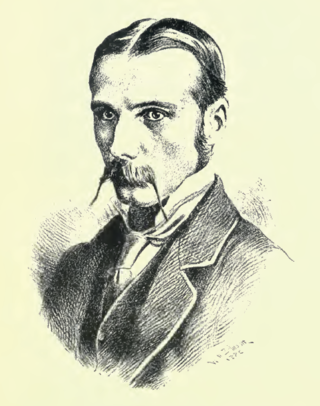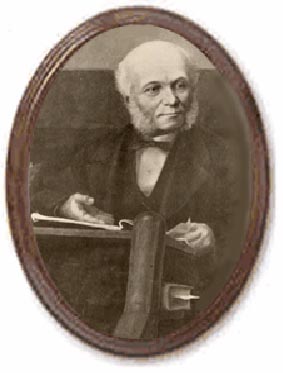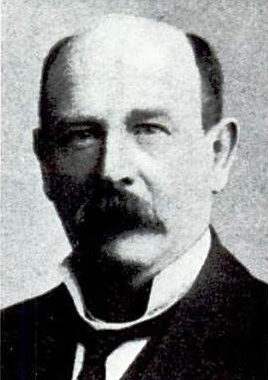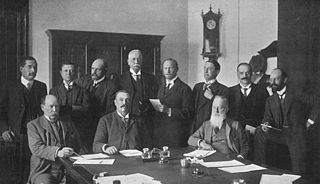
The Transvaal Colony was the name used to refer to the Transvaal region during the period of direct British rule and military occupation between the end of the Second Boer War in 1902 when the South African Republic was dissolved, and the establishment of the Union of South Africa in 1910. The borders of the Transvaal Colony were larger than the defeated South African Republic. In 1910 the entire territory became the Transvaal Province of the Union of South Africa.
The Second Anglo-Boer War had no sooner commenced with the ultimatum of the Transvaal Republic on 9 October 1899, than Mr Schreiner found himself called upon to deal with the conduct of Cape rebels. The rebels joined the invading forces of President Steyn, whose false assurances Mr Schreiner had offered to an indignant House of Assembly only a few weeks before. The war on the part of the Republics was evidently not to be merely one of self-defence. It was one of aggression and aggrandisement. Mr Schreiner ultimately addressed, as prime minister, a sharp remonstrance to President Steyn for allowing his burghers to invade the colony. He also co-operated with Sir Alfred Milner, and used his influence to restrain the Bond.
The year 1870 in the history of the Cape Colony marks the dawn of a new era in South Africa, and it can be said that the development of modern South Africa began on that date. Despite political complications that arose from time to time, progress in Cape Colony continued at a steady pace until the outbreak of the Anglo-Boer Wars in 1899. The discovery of diamonds in the Orange River in 1867 was immediately followed by similar finds in the Vaal River. This led to the rapid occupation and development of huge tracts of the country, which had hitherto been sparsely inhabited. Dutoitspan and Bultfontein diamond mines were discovered in 1870, and in 1871 the even richer mines of Kimberley and De Beers were discovered. These four great deposits of mineral wealth were incredibly productive, and constituted the greatest industrial asset that the Colony possessed.

Sir Thomas UpingtonKCMG (1844–1898), born in Cork, Ireland, was an administrator and politician of the Cape Colony.

John Xavier Merriman was the last prime minister of the Cape Colony before the formation of the Union of South Africa in 1910.
The Unionist Party was a pre-apartheid South African political party, which contested elections to the Union of South Africa parliament from the 1910 South African general election until its merger into the South African Party just before the 1921 South African general election.

General elections were held in South Africa on 15 September 1910 to elect the 121 members of the House of Assembly. They were the first general election after the Union of South Africa was created on 31 May 1910.

Sir John Gordon Sprigg, was an English-born colonial administrator and politician who served as prime minister of the Cape Colony on four different occasions.

Sir Thomas Lynedoch Graham was a South African judge and politician.

Saul Solomon was an influential liberal politician of the Cape Colony, a British colony in what is now South Africa. Solomon was an important member of the movement for responsible government and an opponent of Lord Carnarvon's Confederation scheme.

Jacobus Wilhelmus ("J.W.") Sauer, was a prominent liberal politician of the Cape Colony. He served as Minister in multiple Cape governments, and was influential in several unsuccessful attempts to enshrine equal political rights for black South Africans in the constitution of the Union of South Africa. He was also a strong early supporter of women's rights and suffrage.
The Progressive Party of the Cape Colony was a political party in the Cape Parliament that was primarily composed of and supported by white immigrants to the Cape. It supported pro-imperialist policies, and was in power from 1900 until 1908.

Frederick Schermbrucker (1832–1904) was a soldier and an influential parliamentarian of the Cape Colony. He was a strong pro-imperialist, one of the foremost supporters of Cecil Rhodes and an early leader of the Progressive Party of the Cape.

The Cape Qualified Franchise was the system of non-racial franchise that was adhered to in the Cape Colony, and in the Cape Province in the early years of the Union of South Africa. Qualifications for the right to vote at parliamentary elections were applied equally to all men, regardless of race.

Sir William Thomas Smartt was a South African politician, and founder and leader of the Unionist Party.

The Parliament of the Cape of Good Hope functioned as the legislature of the Cape Colony, from its founding in 1853, until the creation of the Union of South Africa in 1910, when it was dissolved and the Parliament of South Africa was established. It consisted of the House of Assembly and the legislative council.

Sir James Rose Innes was the Chief Justice of South Africa from 1914 to 1927 and, in the view of many, its greatest ever judge. Before becoming a judge he was a member of the Cape Parliament, the Cape Colony's Attorney-General, and a prominent critic of Cecil John Rhodes. His grandson was Helmuth James Graf von Moltke, a prominent opponent of the Third Reich.

Sir James Sivewright K.C.M.G. was a businessman and politician of the Cape Colony. He was a strong political ally of Cecil Rhodes and, as his cabinet minister, was implicated in the "Logan" corruption scandal that led to the fall of the first Rhodes government.

Elections to the Parliament of the Colony of the Cape of Good Hope were held in 1898. The Legislative Council was elected on 16 March and the House of Assembly between 9 August and 5 September. These were the first elections contested on a more-or-less two-party basis after the emergence of responsible government in 1872. Party divisions were still hazy at the time of the elections, but the result was a narrow victory for opponents of the Progressive Party of Cecil Rhodes, despite the Progressives winning the popular vote. Incumbent Prime Minister Gordon Sprigg had become aligned with the nascent Progressive party, and was succeeded by William Philip Schreiner, an Independent supported by the Afrikaner Bond, upon the inauguration of the new House of Assembly.

The National Convention, also known as the Convention on the Closer Union of South Africa or the Closer Union Convention, was a constitutional convention held between 1908 and 1909 in Durban, Cape Town and Bloemfontein. The convention led to the adoption of the South Africa Act by the British Parliament and thus to the creation of the Union of South Africa. The four colonies of the area that would become South Africa - the Cape Colony, Natal Colony, the Orange River Colony and the Transvaal Colony - were represented at the convention, along with a delegation from Rhodesia. There were 33 delegates in total, with the Cape being represented by 12, the Transvaal eight, the Orange River five, Natal five, and Rhodesia three. The convention was held behind closed doors, in the fear that a public affair would lead delegates to refuse compromising on contentious areas of disagreement. All the delegates were white men, a third of them were farmers, ten were lawyers, and some were academics. Two-thirds had fought on either side of the Second Boer War.


















